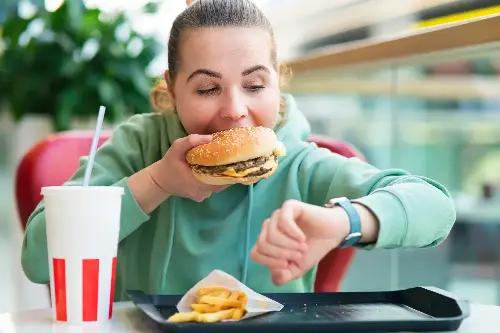In a world where fast-paced living is the norm, it’s easy to carry over that swiftness to our eating habits. But have you ever stopped to consider what wolfing down your meal at lightning speed might be doing to your body and overall well-being? Let’s delve into the not-so-fast side of fast eating and discover why it’s important to chew with care.

The Digestive Dance Begins in the Mouth
While it might seem like digestion is all about the stomach and intestines, it actually starts right in the mouth. The process of chewing not only breaks down food mechanically but also mixes it with saliva to begin the breakdown of starches. When you eat too quickly, you’re likely not chewing adequately, which means your digestive system has to work overtime to process larger chunks of food. This can lead to digestive discomfort, such as bloating, gas, and indigestion.
Mindful Eating for Nutrient Absorption
The act of chewing more thoroughly also has implications for nutrient absorption. Slower chewing increases the surface area of food that comes in contact with digestive enzymes, making it easier for your body to absorb vital nutrients. Racing through a meal robs this chance and can potentially lead to deficiencies, even if you’re eating a nutrient-rich diet.
Fast Eating, Fast Weight Gain?
There’s also a relationship between eating speed and weight management. Fast eaters tend to consume more calories before their bodies can signal satiety – the feeling of fullness. It typically takes about 20 minutes for the brain to register that you’re full. By eating quickly, you’re more likely to overeat and gain weight over time. In contrast, eating slowly can lead to eating less and often results in weight loss or more effective weight management.

The Connection to Metabolic Syndromes
If that wasn’t compelling enough, various studies have highlighted that fast eating may be linked to an increased risk of metabolic syndromes - conditions that elevate the risk of heart disease, stroke, and type 2 diabetes. These can include high blood pressure, elevated blood sugar, excess body fat around the waist, and abnormal cholesterol levels. Adopting a slower pace at meals may not only improve your digestion but could also protect you against these serious health issues.
Eating Quickly and Emotional Well-being
There’s a psychological aspect to our eating speed as well. Eating slowly allows us to appreciate our meals more fully – engaging all our senses and typically increasing satisfaction with our food. It can become a form of mindfulness practice that brings about tranquillity and a greater connection to the eating experience, which can be very beneficial for emotional well-being.
Chew on This: Techniques for Slowing Down
So how do we break the fast-eating habit? It all starts with awareness. Try to be more conscious of every bite you take – savour the flavours, textures, and aromas of your food. You can also put your fork down between bites or set a minimum number of chews per bite as a form of practice. Another effective method is to use timers to stretch out meals, ensuring you take at least 20 minutes to finish your plate.

Fast Food Culture: Reclaiming Our Relationship with Meals
In many societies, the rise of fast food has only exacerbated the issue of rapid eating. Meals are no longer just about sustenance or pleasure; they’re often treated as mere fuel stops in our busy lives. This shift in perspective has health consequences that we’re just starting to unravel. Making a conscious effort to value our meal times, to see them as opportunities for nourishment and enjoyment, may help us break free from the fast food culture and its pace.
The Takeaway: Chew Wisely for Health and Happiness
In conclusion, while it might seem insignificant, the speed at which you eat can have profound effects on your digestive health, weight management, and well-being. By taking the time to chew carefully and eat mindfully, you give your body the best chance to digest food optimally, maintain a healthy weight, and reduce the risk of metabolic diseases. Plus, you get to enjoy the emotional and psychological benefits that come from a more measured and enjoyable approach to eating.
Remember, good things come to those who wait – or in this case, to those who chew with care. Slow down, enjoy your meals, and your body will thank you for it.
